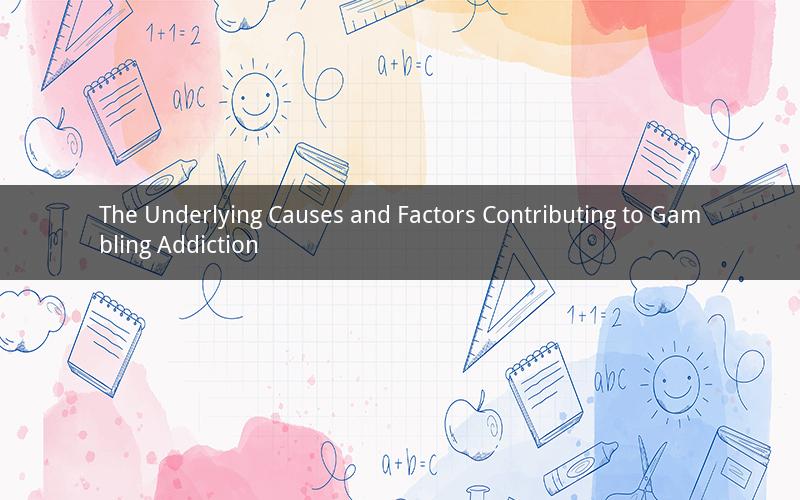
Introduction:
Gambling addiction, also known as pathological gambling, is a complex issue that affects individuals from all walks of life. It is characterized by an uncontrollable urge to gamble, despite negative consequences. Understanding the reasons behind gambling addiction is crucial in addressing this problem effectively. This article explores the various factors and causes that contribute to the development of gambling addiction.
1. Psychological Factors:
a. Low self-esteem: Individuals with low self-esteem may turn to gambling as a way to escape from negative feelings and boost their self-worth. The thrill of winning can provide a temporary sense of accomplishment and validation.
b. Depression and anxiety: People struggling with depression or anxiety may turn to gambling as a form of self-medication. The excitement and adrenaline rush of gambling can temporarily alleviate their symptoms.
c. Impulse control issues: Individuals with poor impulse control may find it challenging to resist the urge to gamble, leading to compulsive behavior.
2. Social Factors:
a. Peer pressure: Peer pressure can significantly influence individuals to engage in gambling activities. The desire to fit in or be accepted by a group may push someone to try gambling, even if they have no intention of developing an addiction.
b. Family dynamics: Growing up in a family with a gambling problem can increase the risk of developing an addiction. Witnessing the negative consequences of gambling can normalize the behavior and make it more appealing.
c. Social environment: Access to casinos, online gambling platforms, and gambling advertisements can contribute to the development of gambling addiction. The easy availability of gambling opportunities can make it difficult for individuals to resist the temptation.
3. Biological Factors:
a. Genetic predisposition: Research suggests that there may be a genetic component to gambling addiction. Individuals with a family history of addiction, including gambling, may be more susceptible to developing an addiction themselves.
b. Brain chemistry: The brain's reward system plays a crucial role in gambling addiction. Dopamine, a neurotransmitter associated with pleasure and reward, is released when individuals win at gambling. Over time, the brain becomes accustomed to the surge of dopamine, leading to increased cravings and dependency.
4. Economic Factors:
a. Financial stress: Individuals facing financial difficulties may turn to gambling as a way to alleviate their worries or as a means of earning money. However, this often leads to further financial problems and exacerbates the addiction.
b. Easy access to credit: The availability of credit cards and online payment methods can make it easier for individuals to gamble excessively. The ease of obtaining money can mask the true extent of their gambling habits and lead to increased spending.
5. Technological Factors:
a. Online gambling: The rise of online gambling platforms has made it more convenient and accessible for individuals to engage in gambling activities. The anonymity and convenience of online gambling can make it harder for individuals to seek help or control their gambling behavior.
b. Mobile devices: The widespread use of smartphones and tablets has further increased the accessibility of gambling. Individuals can now gamble anytime, anywhere, making it easier to develop an addiction.
Conclusion:
Gambling addiction is a multifaceted issue influenced by psychological, social, biological, economic, and technological factors. Understanding these underlying causes can help individuals, families, and society address the problem more effectively. By recognizing the risk factors and seeking appropriate support, individuals can overcome gambling addiction and lead healthier, more fulfilling lives.
Questions and Answers:
1. What are the psychological factors that contribute to gambling addiction?
- Psychological factors include low self-esteem, depression and anxiety, and impulse control issues. These factors can make individuals more susceptible to the allure of gambling and its potential for temporary relief or reward.
2. How can social factors influence the development of gambling addiction?
- Social factors such as peer pressure, family dynamics, and the social environment can play a significant role. Peer pressure can push individuals to try gambling, while family dynamics and the social environment can normalize the behavior and make it more appealing.
3. Are there any genetic factors associated with gambling addiction?
- Yes, research suggests that there may be a genetic component to gambling addiction. Individuals with a family history of addiction, including gambling, may be more susceptible to developing an addiction themselves.
4. How can economic factors contribute to gambling addiction?
- Economic factors such as financial stress and easy access to credit can contribute to gambling addiction. Financial difficulties can drive individuals to gamble as a means of relief or to earn money, while easy access to credit can mask the true extent of their gambling habits.
5. How do technological factors influence gambling addiction?
- Technological factors, such as online gambling platforms and mobile devices, have made gambling more accessible and convenient. The ease of access and the ability to gamble anytime, anywhere can increase the risk of developing an addiction.